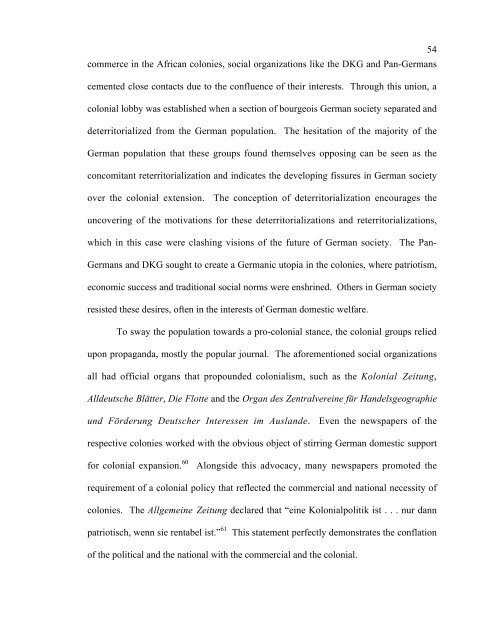A Deterritorialized History: Investigating German Colonialism ...
A Deterritorialized History: Investigating German Colonialism ...
A Deterritorialized History: Investigating German Colonialism ...
Create successful ePaper yourself
Turn your PDF publications into a flip-book with our unique Google optimized e-Paper software.
commerce in the African colonies, social organizations like the DKG and Pan-<strong>German</strong>s<br />
cemented close contacts due to the confluence of their interests. Through this union, a<br />
colonial lobby was established when a section of bourgeois <strong>German</strong> society separated and<br />
deterritorialized from the <strong>German</strong> population. The hesitation of the majority of the<br />
<strong>German</strong> population that these groups found themselves opposing can be seen as the<br />
concomitant reterritorialization and indicates the developing fissures in <strong>German</strong> society<br />
over the colonial extension. The conception of deterritorialization encourages the<br />
uncovering of the motivations for these deterritorializations and reterritorializations,<br />
which in this case were clashing visions of the future of <strong>German</strong> society. The Pan-<br />
<strong>German</strong>s and DKG sought to create a <strong>German</strong>ic utopia in the colonies, where patriotism,<br />
economic success and traditional social norms were enshrined. Others in <strong>German</strong> society<br />
resisted these desires, often in the interests of <strong>German</strong> domestic welfare.<br />
To sway the population towards a pro-colonial stance, the colonial groups relied<br />
upon propaganda, mostly the popular journal. The aforementioned social organizations<br />
all had official organs that propounded colonialism, such as the Kolonial Zeitung,<br />
Alldeutsche Blätter, Die Flotte and the Organ des Zentralvereine für Handelsgeographie<br />
und Förderung Deutscher Interessen im Auslande. Even the newspapers of the<br />
respective colonies worked with the obvious object of stirring <strong>German</strong> domestic support<br />
for colonial expansion. 60 Alongside this advocacy, many newspapers promoted the<br />
requirement of a colonial policy that reflected the commercial and national necessity of<br />
colonies. The Allgemeine Zeitung declared that “eine Kolonialpolitik ist . . . nur dann<br />
patriotisch, wenn sie rentabel ist.” 61 This statement perfectly demonstrates the conflation<br />
of the political and the national with the commercial and the colonial.<br />
54
















